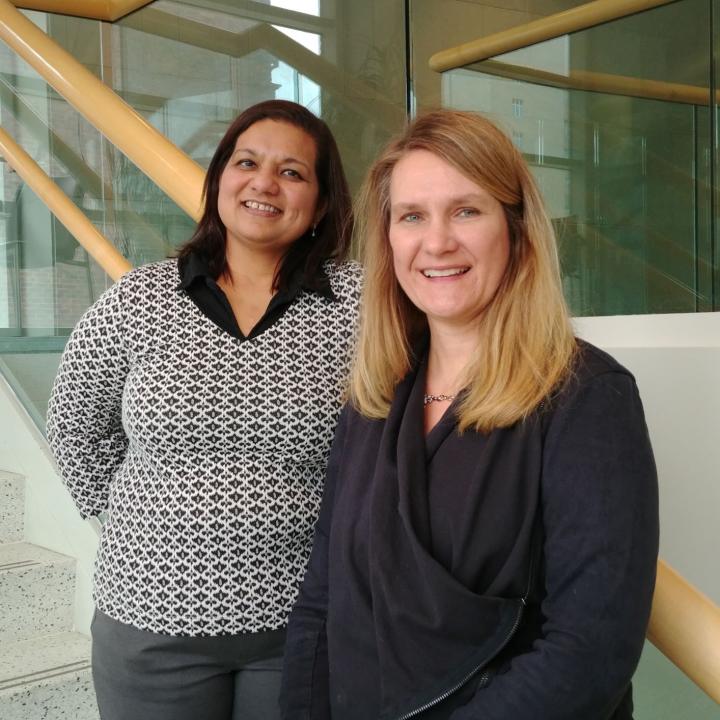
Credit: Case Western Reserve University School of Medicine
More than 125 million people worldwide wear contact lenses, and while many are exposed to relatively common bacteria through their contact lenses, not all contract an eye infection.
Researchers at the Case Western Reserve School of Medicine and University Hospitals (UH) Cleveland Medical Center will study whether a contact-wearer’s genetics may play a role in who does or doesn’t contract infection–especially Microbial keratitis (MK), a bacteria-caused infection of the cornea, which, if left untreated, can cause blindness.
School of Medicine researchers Sudha Iyengar, PhD, and Loretta Szczotka-Flynn OD, PhD, also with UH, have received multi-year grants–from both the National Eye Institute and Alcon Research Ltd.– to study the genetic profile of contact-lens wearers with and without MK. Their research focuses on infections related to the use of soft contact lenses and will explore why some people contract MK and others don’t, despite the fact that most lens users are exposed to bacteria.
“This is the first time that MK has been studied based on the genetics of infected patients compared to ‘super-controls’, people who exhibit significant risk factors for contact lens-related MK but who have never experienced infection,” said Szczotka-Flynn, professor in the Departments of Ophthalmology & Visual Sciences and Population and Quantitative Health Sciences at the School of Medicine and the UH Eye Institute. “Our goal is to identify genetic biomarkers for susceptibility and/or resistance to this devastating infection and thus help eye care providers identify treatment plans or prevention strategies for patients who may require additional caution when wearing contact lenses.”
Szczotka-Flynn also directs the Vision Research Coordinating Center and director of Contact Lens Service at the UH Eye Institute.
Contact-lens use is the leading risk factor for MK in developed countries. Contact lens-related MK (CL-MK) is a painful infection that requires prompt treatment to avoid loss of vision and even blindness. The Centers for Disease Control estimates there are about one million urgent doctor or clinic visits each year for contact-lens complications and keratitis in the United States alone, costing $175 million in direct health-care costs annually.
This study will be conducted over two years with multiple sites nationwide. Patients that have experienced a devastating infection and those who have not, but have significant risk factors, will volunteer for a scan of their genetic pathways.
“This study is unique in that we will define a way to identify genetically at-risk patients, with the goal of eventually helping personalize selection of vision correction or use of selected contact lens types to reduce the risk of a potentially devastating disease,” said Iyengar, professor and vice chair for research in the Department of Population and Quantitative Health Sciences at the School of Medicine. “Our understanding of susceptibility and resistance to MK related to contact-lens use also will inform our general understanding of the mechanism of corneal disease, considering both genetics and ocular pathogens.”
Iyengar is also a professor in the Department of Ophthalmology & Visual Sciences at the School of Medicine.
Although most contact-lens wearers are exposed to a variety of bacteria that can infect the cornea or have hygiene or other risk factors for infection, most do not experience MK. Many research studies involving a range of infections support the understanding that infection can be prompted by varying immune responses that may be informed by a person’s genetic profile. This study of a person’s genetic profile will add to the greater body of knowledge about infection and response or resistance.
###
The National Eye Institute Award of $440,000 is funded to Drs. Iyengar and Szczotka-Flynn through Case Western Reserve University until 2021. The researchers also have received a pilot grant from Alcon Research Ltd. through University Hospitals Eye Institute to support this research. NIH/National Eye Institute grant number: 1 R21 EY029445-01A1
For more information about Case Western Reserve University School of Medicine, please visit: case.edu/medicine.
Media Contact
Ansley Gogol
[email protected]
Original Source
https:/




